July 5, 2014 saw a screening of the documentary film Hafu (Half) (Japan / 2013 / 87 min. Directors: Nishikura Megumi, Takagi Lala), which became a popular topic upon its theater release last year, followed by a talk by Yano David and Sumoto Edward, who featured in the film.
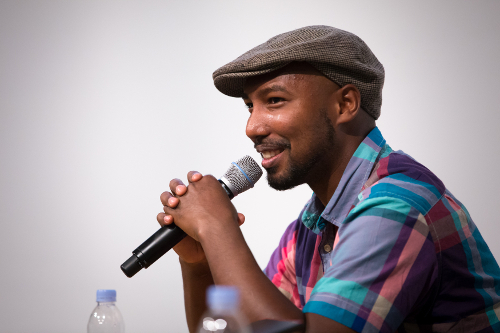
Yano David
What comes to mind when you hear the word "half"? While some are of the view that "double" with its more positive ring is preferable to "half" with its connotations of less than whole, others (e.g. Sumoto Edward) say they are not especially bothered because "half" is already an established "Japlish" usage.
The film Hafu, which deals with people who are "hafu" (half), an appellation used only in Japan to mean those with both a Japanese and a foreign parent, is a documentary covering five hafu born and raised very differently: Sophia, who grew up in Australia and has made her way to Japan to experience life there; David, who spent his first six years in Ghana then grew up in Japan; Alex, who has a Japanese father and Mexican mother and attends elementary school in Japan; Edward, who has a Venezuelan father and having graduated from an American university now is based and works mainly in Japan; and Fusae, whose Korean father was a naturalized Japanese. Each speaks of their memories of struggles that include bullies and discrimination, their current careers, activities and so on, and future prospects. This valuable record that offers an up-close look at the hafu featured prompts us, the viewers, to think about the environment in which such individuals find themselves in Japan, and asks, "What is a Japanese?" And herein lies a theme common to us all: the "search for identity".
Then, at the talk following the screening, a dialogue was held with Yano David and Sumoto Edward who appeared in the film. Yano, whose wide-ranging career includes working as a musician and actor, has formed an organization called "Enjije" to help Ghanaian children, building schools and training educators in Ghana, his second home and where his mother lives. Rather than providing all the funding, Yano has chosen to help by assisting local people in their own fundraising, in the hope that the community will sustain the projects independently. To this end, he organizes children's events such as sports days and soccer games, encouraging surrounding residents to take part, a way to get the whole community on board and lay the foundation for a better educational environment.
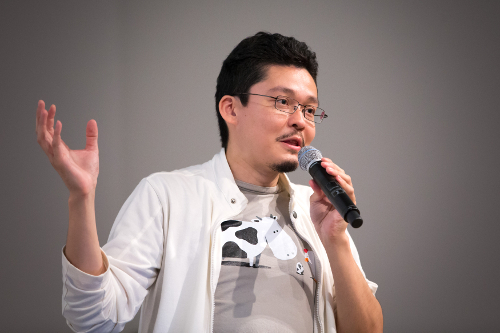
Sumoto Edward
Sumoto Edward, meanwhile, established "Mixed Roots Japan" in 2006, and since then has been working to connect people with diverse origins. Sumoto, who grew up in Nishinomiya, Hyogo, attended not the local public school but an international school in Kobe before going on to university in the United States, so says he had little sense of being part of the "community" in the town where he grew up. Sumoto feels that his work with Mixed Roots has helped him to find his place, and to explore ways to facilitate multicultural harmony and symbiosis in Japan he organizes numerous debates and workshops in conjunction with universities.
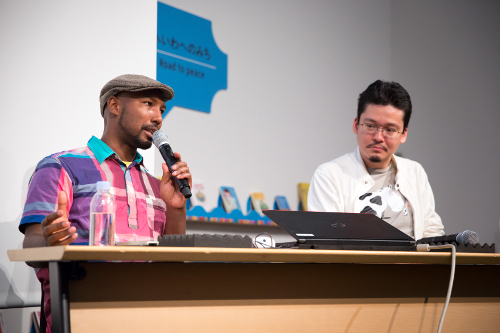
Listening to the pair, one could sense that what they share is a positive outlook, and a desire to get out there and make things happen. Overcoming as they have challenges such as being discriminated against because of their different appearance, and serious family discord, to make the most of the multiple cultures within themselves and connect with society, their turnaround in ideas and proactive power embolden us all. Being raised in an environment where they could not help but be conscious of being different to those around them is precisely what has enabled the pair to "invent" new kinds of bond that differ from conservative blood ties and localities.
Having no "place," being alone: these are now huge problems for Japanese society as a whole. The connections between people, the mutual support of the sort promoted by individuals such as Yano and Sumoto can only become more necessary. In an age when one in thirty children born in Japan has a foreign parent, it would seem there is still much for us to consider if we are to become a more open society that acknowledges diversity. This was time well spent gaining some ideas on how to do just that.
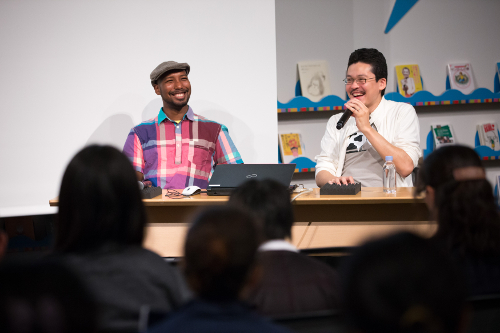
At the Post-Screening Special Talk
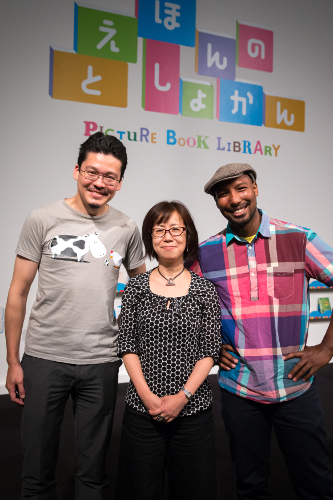
"Go-Betweens" curator Araki Natsumi (center) with Yano David (right) and Sumoto Edward (left), following the Post-Screening Special Talk
Text: Araki Natsumi (Curator, Mori Art Museum)
Photographs: Tayama Tatsuyuki
■Relevant information
・"Go-Betweens: The World Seen through Children"
Exhibition Period: Saturday, May 31 - Sunday, August 31, 2014
・"MAM Project 021: Melvin Moti"
Exhibition Period: Saturday, May 31 - Sunday, August 31, 2014








